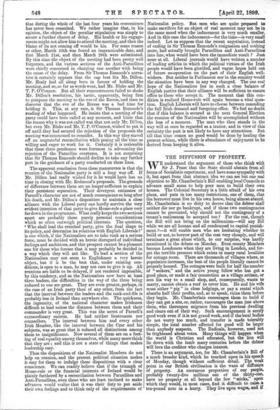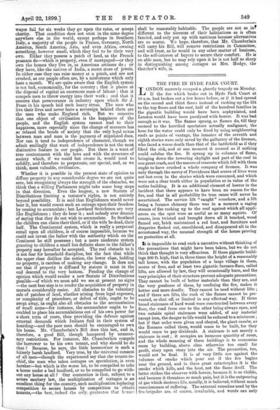THE DIFFUSION OF PROPERTY.
WE understand the argument of those who think with Sir J. Pease that the State should abstain from all forms of Socialistic experiment, and have some sympathy with it, but apart from that abstract idea we can see but one real objection to Mr. Chamberlain's Bill enabling local Councils to advance small sums to help poor men to build their own houses. The Colonial Secretary is a little afraid of his own plans, and puts in too many restrictions, one of them, that the borrower must live in his own house, being almost absurd. Mr. Chamberlain is no deity to decree that the debtor shall neither die nor go bankrupt, and if those two contingencies cannot be prevented, why should not the contingency of a tenant's restlessness be accepted too ? For the rest, though the Bill will not bring on the millennium—will any Bill while we are all human and all condemned to capital punish- ment ?—it will enable men who are hesitating whether to build or not, to borrow part of the cost very cheaply, and will terminate a great abuse which, to our surprise, was hardly mentioned in the debate on Monday. Even county Members become Londoners when they are living in London, and for- get the terrible pressure which exists in many rural localities for cottage room. There are thousands of villages where, as population increases, the best of the people literally cannot be properly housed. The cottages were built for half the number of seekers," and the active young fellow who has got a good place, or made a fair connection as a village artisan, or sees his way to a small shop, and, consequently, wants to marry, cannot obtain a roof to cover him. He and his wife must either " pig " in close lodgings, or pay a rental which absorbs half their profits, and, so to speak, ruins them before they begin. Mr. Chamberlain encourages them to build if they can get a site, or, rather, encourages the man just above them, who thereupon migrates from his previous dwelling and clears out of their way. Such encouragement is surely good work even if it is not grand work, and if the local bodies do not worry too much, and transfer is made tolerably simple, the total number affected for good will be larger than anybody suspects. The Radicals, however, need not be frightened about votes. Many things will happen when the world is Christian and educated, but the lion Will lie down with the lamb many centuries before the debtor will love the creditor who charges interest.
There is an al.: ent, too, for Mr. Chamberlain's Bill of a much broader d, which he touched upon in his speech of Monday, though without sufficient detail. The Wqr point in our British civilisation is the want of aiffusion of property. An enormous proportion of our people, probably twenty-five millions out of the thirty-one, have no property at all beyond the few "sticks," upon which they would, in most cases, lind it difficult to raise, a ten-pound note in a hurry. They live upon wages, and if wages fail for six weeks they go upon the rates, or accept charity. That condition does not exist in the same degree anywhere else in the world, except perhaps in Southern Italy, a majority of the people in France, Germany, North America, South America, Asia, and even Africa, owning something, however small, which they feel to be their very own. Either they possess a patch of land, as the French peasants do—which is property, even if mortgaged—or they own the houses they live in, as American artisans do ; or they have, like the natives of India, a secret store of jewels. In either case they can raise money at a pinch, and are not crushed, as our people often are, by a misfortune which only lasts a month. We are quite aware that the English system is not bad, economically, for the country ; that it places at the disposal of capital an enormous mass of labour ; that it compels men to throw energy into their work ; and that it ensures that perseverance in industry upon which Sir J. Pease in his speech laid such heavy stress. The men who live their lives and never have a sovereign behind them are the men who make England rich. But we conceive that one object of civilisation is the happiness of the people, and the English system cannot lead to their happiness, more especially since the change of manners has so relaxed the bonds of society that the only legal nexus between man and man is the payment of stipulated dues. Nor can it tend to independence of character, though we admit smilingly that want of independence is not the most distinctive feature in our people. But there is a want of true contentment with the laws and with the structure of society which, if we could but create it, would tend to solidify, and therefore to perpetuate, our special, and, as we think, most valuable, civilisation.
Whether it is possible in the present state of opinion to diffuse property in any considerable degree we are not quite sure, but recognising always the strength of the obstacles, we think that a willing Parliament might take some long steps in that direction. Even the longest, a new Statute of Distributions limiting a testator's rights, is not entirely beyond possibility. It is said that Englishmen would never bear it, but would resent such an outrage upon their freedom by ceasing to accumulate; but Lowland Scotchmen are very like Englishmen ; they do bear it ; and nobody ever dreams of Saying that they do not wish to accumulate. In Scotland the children can claim their third, or if the wife be dead, their half. The Continental system, which is really a perpetual entail upon all children, is of course impossible, because we could not invest the father with the authority which on the Continent he still possesses ; but a more moderate system granting to children a small but definite share in the father's property may hereafter be accepted. The real obstacle to it is not fear for household discipline, but the fact that while the upper class dislikes the notion, the lower class, holding no property, is careless of making any change. It does not see that if property is diffused by statute it must in the end descend to the very bottom. Pending the change of opinion which _would render a new Statute of Distributions possible—of which we must add we see at present no signs —the nett best step is to render the acquisition of property in morsels considerably easier. All obstacles to the voluntary sale of patches of land, whether arising from legal expenses, Or complexity of procedure, or defect of title, ought to be swept away,-as ought also all obstacles to the accumulation of" 'small mins—for instance, the accumulator ought to be enabled to place his accumulations out of his own power for ashort term of years, thin providing the defence against external demands which Indians find in their system of boarding—and the poor man should be encouraged to own his house. Mr.. Chamberlain's Bill does this last, and is, therefore, a good Bill,- though hampered by unneces- sary restrictions. For instance, Mr. Chamberlain compels the borrower to be his own tenant, and why should he do that ? Because, he says, the little houseowner is such a -bitterly harsh landlord. Very true, by the' universalconsent -of all men—though the experienced say that the tenant-in- chief, the man who takes cottages on speculation, is even -harsher—but which is the worse lot, to be compelled to take a house under a bad landlord, or to be compelled to go with- out any house at all ? Our contention is that, subject to a severe sanitary law, the multiplication of cottages is an excellent thing for the:country, such multiplication replacing competition to secure houses by competition to obtain tenants,—the best, indeed the only, guarantee that hcuse3 shall be reasonably habitable. The people are not so int different to the niceness of their habitations as is often fancied, and only put up with nastiness because alternatives are so scarce. We hope, therefore, that Mr. Chamberlain will carry his Bill, will remove restrictions in Committee, and will trust, as he would in any other matter of business, to the self-interest of buyers to secure their comfort. He is an able man, but he may rely upon it he is not half so sharp in distinguishing among cottages as Mrs. Hodge, the thatcher's wife, is.







































 Previous page
Previous page